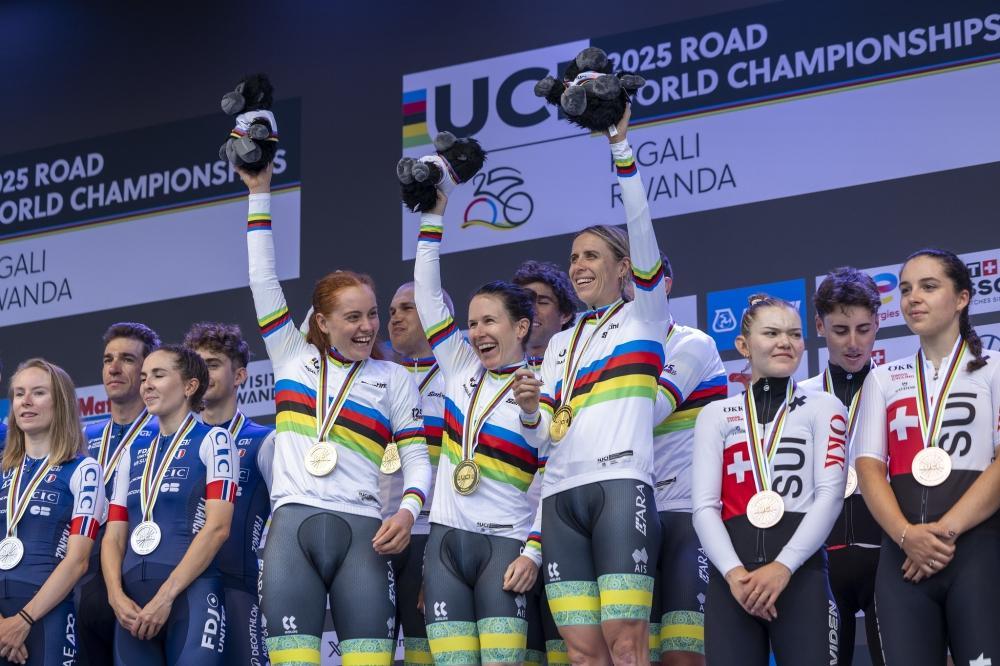Africa-Press – Rwanda. Rwanda’s public finance journey is a story of dreaming big, acting in an equally big manner, but more importantly, consistency and strategy. Rwanda has come a long way in public financial management and is now being recognised as a trailblazer in this area. It is a journey that shows that nothing is impossible, if you can dream it and work on the dream.
In the same breath, the national sports strategy is one of dreaming big and going for the prize, even when it seems impossible. We have seen significant investments in the sports industry over the past few years which are starting to bear fruit and putting Rwanda at the centre of the world sports arena. Are there parallels between the public finance journey and the sports strategy? Let us explore further.
PICTORIAL: Kagame graces UCI 2025 closing ceremony as Pogačar retains world title
As world-renowned cyclists raced through Kigali’s hills – the land of 1,000 hills and 1,000 smiles – between September 21–28, 2025, we found ourselves reflecting deeply. The sheer determination etched on the faces of those riders from over 100 nations reminded us of a universal truth: achieving greatness demands grit.
There are always obstacles to overcome, hills and mountains to climb, cobbled roads to endure, and—most importantly— a focus to maintain.
Rwanda made history as the first African country to host the elite UCI Road World Championships, beating top contenders like Morocco and South Africa. In doing so, we proved that our geographical size does not limit our ambition. Our GDP does not define our trajectory. What matters is the courage to dream and the will to push beyond limits. This is a story we will remember for generations. Don’t be surprised if you read another article from us with reflections from this world class event.
As UCI President David Lappartient remarked at the closing ceremony, “The city of Kigali has done more than we ever expected.” This praise from the sport’s highest authority underscores Rwanda’s ability to deliver world-class events and exceed global expectations.
Just as Rwanda showcased its resolve on the global cycling stage, it has also been making bold strides in Public Financial Management (PFM) reforms. Over the past decade, Rwanda has undertaken transformative reforms, including a major shift in how government financial reporting is done. While many countries remain with the rudimentary cash basis of accounting and hesitant to fully embrace international reporting frameworks like IPSAS, Rwanda has taken the bull by the horns.
International Public Sector Accounting Standards (IPSAS), are issued by the International Public Sector Accounting Standards Board (IPSASB). They represent a global benchmark for transparency and accountability in public sector financial reporting.
Drawing a parallel to the UCI Championships, Rwanda is equally racing toward a future defined by accountability, transparency, and global relevance. The IPSAS accrual reform is not just a technical process—it’s the silent engine powering Rwanda’s rise among the world’s best. While few countries have dared to lead in this space, Rwanda is not afraid to set the pace.
So, back to the UCI World championship, whether it was the team trials, relays, or elite races, the determination of individual cyclists and their teams was critical. Once they joined the race, their eyes were fixed on the finish line. Dropping out was not an option. It was a mindset of “no retreat, no surrender.” We believe the Government of Rwanda shares this same resolve in its journey towards IPSAS compliance—despite the challenges, the hills, the weather, or even the occasional punctures. The race is real, and it must be completed—and won.
Along the way, we learned new terms in cycling races like Peloton—the main group of riders who ride closely together to reduce wind resistance and conserve energy. It’s a metaphor for collaboration, strategy, and shared momentum—values that also underpin successful reform.
The public sector practitioners, led by Ministry of Finance and Economic Planning (MINECOFIN) form this peloton for public financial reforms, and especially IPSAS implementation.
So, we are curious to see how this historic cycling event will be reflected in Rwanda’s June 2026 financial statements in line with IPSAS. How will we quantify the goodwill generated by hosting the UCI World Championships? One of the most punishing sections of the race was the Côte de Kimihurura, a cobbled climb that tested every rider’s endurance. Should it be capitalized in our national accounts, as part of heritage assets?
Mwangi Karanja is a Partner at PwC Rwanda and leader of the Government and Public Services Peloton in Rwanda. Jean de la Croix Ndahunga is a member of the Peloton at PwC Rwanda.
For More News And Analysis About Rwanda Follow Africa-Press






